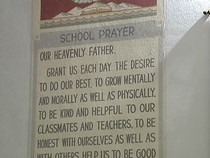High school sophomore challenges prayer banner at school

Jessica Ahlquist attends Cranston High School West in Rhode Island. The 15-year-old is an atheist and claims a banner that hangs in the school auditorium is offensive to students of other faiths. The banner reads:
Our Heavenly Father,
Grant us each day the desire to do our best,
To grow mentally and morally as well as physically,
To be kind and helpful to our classmates and teachers,
To be honest with ourselves as well as with others,
Help us to be good sports and smile when we lose as well as when we win,
Teach us the value of true friendship,
Help us always to conduct ourselves so as to bring credit to Cranston High School West.
Amen
 The banner has hung at the school for over fifty years (since 1963). Jessica and the American Civil Liberties Union filed a lawsuit against the City of Cranston in April, 2011. Jessica claims that the banner violates the First Amendment prohibition against government favoring one religion over another. The Establishment Clause of the First Amendment reads: “Congress shall make no law respecting an establishment of religion … .”
The banner has hung at the school for over fifty years (since 1963). Jessica and the American Civil Liberties Union filed a lawsuit against the City of Cranston in April, 2011. Jessica claims that the banner violates the First Amendment prohibition against government favoring one religion over another. The Establishment Clause of the First Amendment reads: “Congress shall make no law respecting an establishment of religion … .”
What do you think about this? Should Jessica’s objection to the prayer displayed at her high school be recognized? Is this similar to a display of the Ten Commandments or quoted scripture from the Torah or Koran hanging in classrooms or hallways? Even if such a display has a history of decades at the school, should that overrule what the First Amendment guarantees?
Update: In January 2012, a federal judge ruled in Jessica’s favor and ordered the immediate removal of the prayer banner as it violated the First Amendment’s Establishment Clause. “No amount of debate can make the School Prayer anything other than a prayer, and a Christian one at that,” the judge wrote in his opinion. The school district was also ordered to pay Jessica’s legal fees which are reported at $173,000. She has been criticized by members of her community but remains firm in her position. In February, 2012, the school board decided not to appeal the court’s ruling.



These types of cases pop up about two or three times each year.
Basically the law in this area is clear, so long as the banner or other religious material does not make a specific reference to a specific ‘religious figure’ like Jesus or Muhammod and so long as the banner or other religious material does not appear on its face to be a government endorsement of a particular religion, then the banner or other religious material falls under the protection of the 1st amendment ‘freedom of speech’.
In this case, I do not think the sophomore has a case. The banner only refers to a ‘Heavenly Father’ and it does not appear to be a government endorsement of a specific religion…the banner is merely an expression of spirituality.